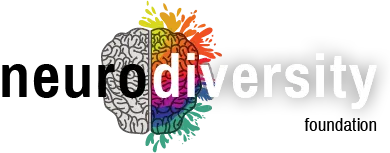Connect With Us
Growth Traits - Learning To Adjust Can Be The Path To Success
We often hear to much about our deficits and how we need to change to accomodate neurotypical expectations. To some extent, that is true depending on our life and career goals. Here are the traits people identify with neurodivergence and at least one way to adjust.
Please support the Neurodiversity Foundation so we can continue to build support and educational programs from people like you have found the best ways to be successful in the workplace, personal relationships, self-esteem, physical health and contribution to society.
Sensory Sensitivities
Hypersensitivity: Overwhelming reactions to certain sounds, lights, smells, textures, or tastes.
Impact : Avoiding social interactions, hiding from others, or experiencing meltdowns due to sensory overload.
Solutions :
Preparation: Take noise cancelling headphones, sunglasses, comfort clothes, and your familiar "safety items".
Sensory Integration Therapy : Techniques like deep pressure, brushing, or joint compressions can help desensitize individuals to overwhelming stimuli.
Personalized Coping Strategies : Identifying specific triggers and developing personalized coping mechanisms, such as earplugs for loud noises or sunglasses for bright lights.
Social Challenges and Communication Breakdowns
Communication: Difficulty initiating or maintaining conversations, interpreting social cues, or developing meaningful relationships.
Impact: Feeling isolated, struggling with emotional regulation, or experiencing anxiety in social situations.
Solutions: As much as we desire otherwise, the reality is we have to adjust to others faster than they adjust to us.
Social Skills Training : Teaching individuals with autism how to initiate conversations, interpret social cues, and develop friendships through structured training programs.
Emotional Regulation Strategies : Learning techniques like deep breathing, mindfulness, or emotional labeling to help regulate emotions and improve communication.
Research Options: Most of our most successful mentors have experimented with different coping strategies and found what is best for them. We can't say all autism information is helpful, we try to share authentic guidance as our staff is overwhelmingly on the spectrum and highly qualified behavioral health specialists, physicians, genetics researcher who happen to be just like you or the person you care about. We will continue to publish regularly to keep you in the know as we discover new ways to succeed and grow.
Executive Functioning Deficits (EFD)
Executive Function: Struggling to plan, organize, prioritize tasks, and regulate emotions, leading to difficulties with time management and daily routines.
Impact: Experiencing stress, feeling overwhelmed, or having trouble completing tasks due to organizational challenges.
Symptoms: Procrastination, piles of things, distracting yourself, avoiding situations and feelings.
Solutions:
Visual Reminders and Schedules : Using visual aids, such as calendars or to-do lists, to help individuals with autism stay organized and on track.
Task Analysis and Prioritization : Breaking down complex tasks into smaller steps and prioritizing them to improve time management and reduce stress.
Planning and Organization: Difficulty initiating or completing projects.
Time Management: Chronic lateness or consistently running out of time for tasks.
Task Initiation and Completion: Avoidance of tasks due to perceived difficulty or anxiety.
Multitasking and Attention: Struggling to focus on multiple tasks simultaneously.
Working Memory and Mental Math: Trouble recalling phone numbers, passwords, or simple arithmetic facts.
Self-Regulation and Emotional Control: Struggling to manage emotions in response to stressors.
Self-Monitoring and Self-Correction: Difficulty tracking personal habits or routines.
Adapting and Flexibility: Resistance to changes in routine or unexpected events.
Solutions and Strategies to Compensate for EFDs:
Break tasks into smaller steps : Divide complex tasks into manageable pieces.
Use visual aids : Visual calendars, charts, or reminders can aid organization and planning.
Create routines : Establish daily routines to structure time and minimize anxiety.
Prioritize tasks : Focus on high-priority activities first, then move on to less important ones.
Use memory aids : Write down phone numbers, passwords, or important information to reduce forgetfulness.
Practice self-regulation techniques : Learn deep breathing, mindfulness, or emotional labeling to manage emotions and impulses.
Social Characteristics
Initiating or Maintaining Conversations : Difficulty starting conversations or engaging with others.
Impact: Struggling to maintain conversations due to anxiety or lack of interest.
Solutions:
Structured conversation training : Teach individuals with autism strategies for initiating and maintaining conversations, such as using pre-planned topics or questions.
Peer Groups and Quality Resources (Such as Neurodiversity Foundation)
Watching Movies and TV: Learn what works for you. Emulation is a key way we learn.
Reading Books and Imagining Conversations: Then try to talk to your family and friends.
Interpreting Social Cues : Difficulty understanding nonverbal cues (e.g., body language, facial expressions)
Impact: Trouble recognizing sarcasm, irony, or other subtle nuances in communication.
Solutions:
Social Skills Training : Provide explicit instruction on interpreting social cues and responding appropriately.
Personal Research: One of the best TV programs we have found is "Lie to Me" with Tim Roth. It is based on actual anthropological research and is a scientific view of understanding facial expressions. This was extremely helpful to our founder who has Prosopagnosia. It has allowed him and others to identify micro expressions to fuel his understanding of emotion. There are similar tools for understanding body language and neurolinguistics.
Developing and Maintaining Friendships : Difficulty forming and maintaining friendships due to anxiety, shyness, or lack of interest.
Impact: Struggling to understand social norms and expectations in relationships.
Solution:
Peer-Mediated Interventions : Pair individuals with autism with peers who can facilitate interactions and provide support.
Emotional Regulation and Expression : Difficulty recognizing and expressing emotions in a socially acceptable manner.
Impact: Trouble regulating emotions, leading to mood swings or meltdowns.
Solution:
Emotionally Intelligent Activities : Engage individuals with autism in activities that promote emotional awareness and regulation, such as art therapy or role-playing exercises.
Thought Experiments: Try to work through the situations that are most triggering and prepare your best response and try to follow your best intentions in a situation. Try to give yourself an escape plan so you have one to give you courage to perservere in the situation.
Cooperation and Teamwork : Difficulty working collaboratively with others due to lack of understanding or social anxiety.
Impact: Struggling to recognize the importance of cooperation and teamwork.
Solution:
Group Work Training : Teach individuals with autism strategies for collaborating with peers, such as sharing responsibilities or compromising on decisions.
Team and Family Activities: One creative way we were able to raise our neurodivergent family's willingness and efficacy of cooperation was to imbed it into our family games and chores. "Call of Duty" was very popular (but any multiplayer team game will do) so we invented a game within the game called "Zombies for Prizes". If the "team" cooperated to achieve certain levels within the game (Level 20 or higher on "Town/Survival") they were rewarded with ice cream, bowling or other activities. This got them to focus on the others activities and coordinate. It has a powerful effect on teamwork and that translated into cooperation in other areas of life. It is not orthodox, but it worked wonderfully.
More to Come..
Let us know what other issues you would like us to suggest solutions for on the site. We are working to build our own private AI pilot just for neurodivergent people to assist them with problems, chores and various activities.
PROGRAMS
PLATFORMS
ND FOUNDATION
PARTNERSHIPS
LEGAL
Copyright 2025. Neurodiversity Foundation. All Rights Reserved.








